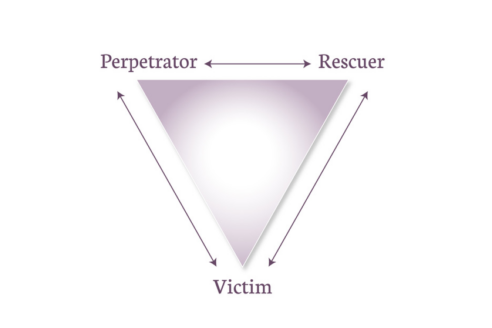As a psychologist specializing in healing from addictions and relationship counseling, I am frequently confronted with difficult situations in relationships. The pain involved in an unhealthy relationship is enormous yet people stay stuck in their discomfort for many years. Why? When confronted with this overwhelmingly difficult question, I like to explain it in more simple terms. Recently, I have been utilizing Stephen Karpman’s Drama Triangle (1968) to explain dysfunctional relationships and why people stay in them.

Although Karpman described this triangle over fifty years ago, it can still apply to our relationships today. He explained it as a social model of human interaction where there is a map of destructive interactions that can occur between people in conflict. I have adapted this model by putting my own modern spin on it to help my patients understand why they are feeling dissatisfied in their relationships. For simplicity, I have described each of the roles with masculine pronouns, however each of the categories could be taken on by individuals of any gender.
At the bottom of the triangle is the victim role. This is the person in a relationship who feels oppressed, helpless, hopeless, powerless, ashamed and unable to function effectively. He is the person who says ”Poor me”. He struggles with solving problems or finding any pleasure in life. This is a person who lacks any accountability and subsequently does not gain insight into his situation. He often feels depressed or anxious along with a great deal of shame. This position is so painful that after a while it may become intolerable. This role could be the woman whose husband is an addict, or the man who was fired from his job. It could be the spouse whose partner had an affair. It is a person who feels like he has no power in the present situation. Because this position in the triangle is so painful, the victim may quickly move to one of the other roles.
For example, the victim may take on the rescuer role where he says “Let me help you.” This is the role of being an enabler. The benefit of this role is that when someone focuses all of his energy on someone else, it enables him to ignore his own anxiety and issues. The negative effects of this role is that it can keep the victim dependent and give the victim permission to fail. Additionally, when a person feels like he does not have any worth, he will keep trying to prove his value by “doing more and more.” Examples of this are: compulsive caretaking including doing all of the housework, taking care of all of the child care responsibilities, along with working full time and then feeling like a martyr. Once the rescuer feels resentful, like a martyr it is easy to switch roles again and enter the persecutor role.
The persecutor role is the victimizer. He is the villain or the offender and acts out his rage. He may say “It is all your fault.” He can be controlling, blaming, critical, oppressive, rigid and superior. The persecutor acts entitled and shows his anger through his bad behavior. He can scream in rage and be physically, emotionally or sexually abusive. The victimizing may be overt such as being physically abusive, or it can be covert such as having an affair. The persecutor’s behavior is a way of indulging in entitlement or displaying rage. It could involve compulsive shopping, gambling or drinking until oblivion. After acting out in that way, the persecutor feels terrible about himself and often can not tolerate this role anymore, so he switches to being a victim again, or tries to make up for his wrong actions by compulsively caretaking in the rescuer role.
This is called a triangle of dysfunction. There is very little health on this triangle and partners often stay stuck in their pathology. In fact, I have often seen individuals lose years of their lives to this “dance” remaining a victim, perpetrator or rescuer. The only way out of this triangle is through vulnerability. It takes a person willing to risk looking at his own part and behaviors through accountability, honesty and acknowledgement. Therapy is a process that can help individuals look at the part they play on this triangle and share their feelings of pain and fear that are occurring beneath the surface. Through honest sharing of emotions, couples find their way to more straightforward ways of relating to one another and finally step off of the drama triangle.

